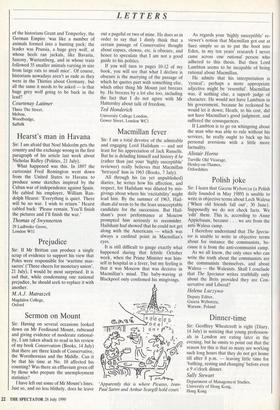Macmillan fever
Sir: I am a total devotee of the admirable and engaging Lord Hailsham — and not least for his appreciation of Jack Russells. But he is deluding himself and history if he (rather than just your 'highly susceptible' reviewer) really believes that Macmillan `betrayed' him in 1963 (Books, 7 July).
All through his (as yet unpublished) diaries, he writes how his affection, and respect, for Hailsham was diluted by mis- givings about where his 'excitability' might lead him. By the summer of 1963, Hail- sham did seem to be the least unacceptable candidate for the succession. But Hail- sham's poor performance at Moscow prompted him seriously to reconsider. Hailsham had showed that he could not get along with the Americans — which was always a cardinal point in Macmillan's eyes.
It is still difficult to gauge exactly what happened during that febrile October week, when the Prime Minister was him- self in hospital in a fever, but my feeling is that it was Moscow that was decisive in Macmillan's mind. The baby-waving at Blackpool only confirmed his misgivings.
'Apparently this is where Picasso, Jean- Paul Sartre and Arthur Scargill hold court.' As regards your `highly susceptible' re- viewer's notion that Macmillan got out at Suez simply so as to put the boot into Eden, in my ten years' research I never came across one rational person who adhered to this thesis. But then Lord Lambton seems to be incapable of being rational about Macmillan.
He admits that his interpretation is `cynical': perhaps a more appropriate adjective might be 'resentful'. Macmillan was, if nothing else, a superb judge of character. He would not have Lambton in his government, because he reckoned he would let it down; Heath, to his cost, did not have Macmillan's good judgment, and suffered the consequences.
If Lambton is to go on whingeing about the man who was able to rule without his services, he really ought to back up his personal aversions with a little more factuality.
Alistair Home
Turville Old Vicarage, Henley-on-Thames, Oxfordshire


















































 Previous page
Previous page